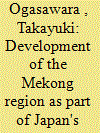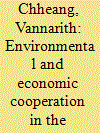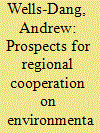| Srl | Item |
| 1 |
ID:
138748


|
|
|
|
|
| Summary/Abstract |
Japan's active engagement in the development of the Mekong region since the 1990s needs to be understood not only from an economic but also from a diplomatic perspective. Japan seeks to collaborate with ASEAN in facilitating multilateral “political dialogue” in the Asia-Pacific region and building an East Asian order based on “universal values” such as democracy and the rule of law, and the Mekong region could be the “weakest link” of ASEAN. After outlining Japan's twenty-year undertaking to cultivate Mekong-Japan cooperation, the author suggests that it is time to broaden the scope of the cooperation and accelerate Japan's “proactive contribution to peace” policy to cope with the changing security environment.
|
|
|
|
|
|
|
|
|
|
|
|
|
|
|
|
| 2 |
ID:
100151


|
|
|
|
|
| Publication |
2010.
|
| Summary/Abstract |
Greater Mekong Subregional Integration has been promoted quite remarkably in the past decade with the support from key international and regional actors. Hard and soft infrastructure has been developed extensively. The road connection development in the Greater Mekong Subregion under the framework of East-West Corridor and North-South Corridor encourages more human and goods exchanges. The policy coordination and harmonization among the countries in the region have been upgraded but at a very slow pace. The future of the regional integration in the region is realizable through hard and soft infrastructure integration. As this article attempts to demonstrate, the main concern, though, still surrounds the issue of political willingness and real cooperation.
|
|
|
|
|
|
|
|
|
|
|
|
|
|
|
|
| 3 |
ID:
142082


|
|
|
|
|
| Summary/Abstract |
Environmental Impact Assessment (EIA) is a central process in sustainable development to mitigate the anticipated impacts of development projects. Every national government in mainland Southeast Asia has, or is in the process of developing, legislation on environmental governance and shares a common interest in implementing and enforcing EIA. Yet despite the fact that significant environmental impacts occur across borders, no multi-country EIA agreements have yet been passed and implemented. Increased regional cooperation could present an opportunity to address this gap, potentially linked to ASEAN or other regional organizations. Based on this hypothesis, a consultative research process under the auspices of the Mekong Partnership for the Environment interviewed 127 key stakeholders in five countries (Cambodia, Laos, Myanmar, Thailand, and Vietnam) to assess the positions, levels of influence and readiness to cooperate on EIA principles and standards. Using a political economy approach, the research team found strong support among government and non-governmental stakeholders alike for reform of national EIA procedures, increased public participation and the development of regional EIA standards. At present, government officials in some countries favour increased cooperation, while others express reservations and concerns about the value of such cooperation. The article explores the underlying interests and incentives behind these varied standpoints and concludes with a discussion of possibilities for regional institutions, national governments and donor agencies to advance cooperation on environmental governance.
|
|
|
|
|
|
|
|
|
|
|
|
|
|
|
|